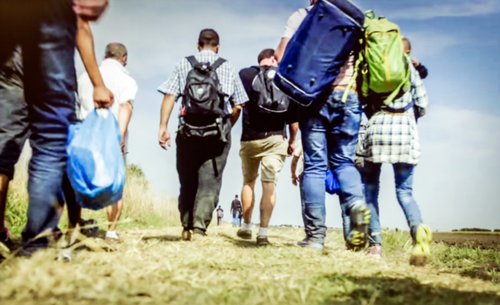Belgium, (Brussels Morning Newspaper) Polish and Czech officials warned on Sunday that their respective ability to handle and house the ongoing influx of Ukrainian refugees is becoming more and more strained.
Roughly 3.5 million Ukrainians have fled the country since Russia launched the war there, with UN data showing that most arrived in Poland, Slovakia, Romania and Hungary, Reuters reported yesterday.
Vít Rakušan, the Czech Republic’s Interior Minister, indicated that his government plans to call for an extension of the state of emergency in order to handle the influx.
“The Czech Republic is balancing on the edge of capacities where we are able to provide comfortable living conditions”, Rakušan warned and pointed out “living in gyms, sleeping bags, or campsites is not good for life.”
Last week, the Czech Republic approved regulations aimed at helping Ukrainian refugees to access the labour market, receive healthcare and education.
Warsaw at full capacity
Since the start of the war, more than two million Ukrainians have arrived in Poland, where authorities temporarily converted Warsaw’s National Stadium into an administration office to process refugees.
Polish officials say that because of the influx Warsaw’s population has increased by 17%.
According to Monika Beuth-Lutyk, Warsaw City Council spokeswoman, “we never know how many refugees will arrive”, the local authorities have “done everything we can and the next move is up to the government to implement a system and to build refugee towns.”
The UN’s International Organization for Migration (IOM) noted that thousands of Ukrainian refugees were entering Poland each day at the Medyka crossing alone. “We don’t know how many people and we don’t know when they will arrive,” IOM spokesman Jorge Galindo stressed.
Medyka is Poland’s busiest crossing on the border with Ukraine.
Iryna Vereshchuk, Ukraine’s Minister of Reintegration of Temporarily Occupied Territories, announced the opening of seven humanitarian corridors on Sunday to help civilians evacuate.
Aid groups announced they were preparing for a surge of Ukrainian refugees if corridors allowed evacuation from areas under siege.
When the war in Ukraine broke out on 24 February, Moscow described its attack as a special operation designed to demilitarise Ukraine while the West condemned the move as an invasion. Since Ukrainian authorities introduced conscription, men of military age were required to remain in the country, which has meant that the majority of the refugee exodus is made up of women and children.




